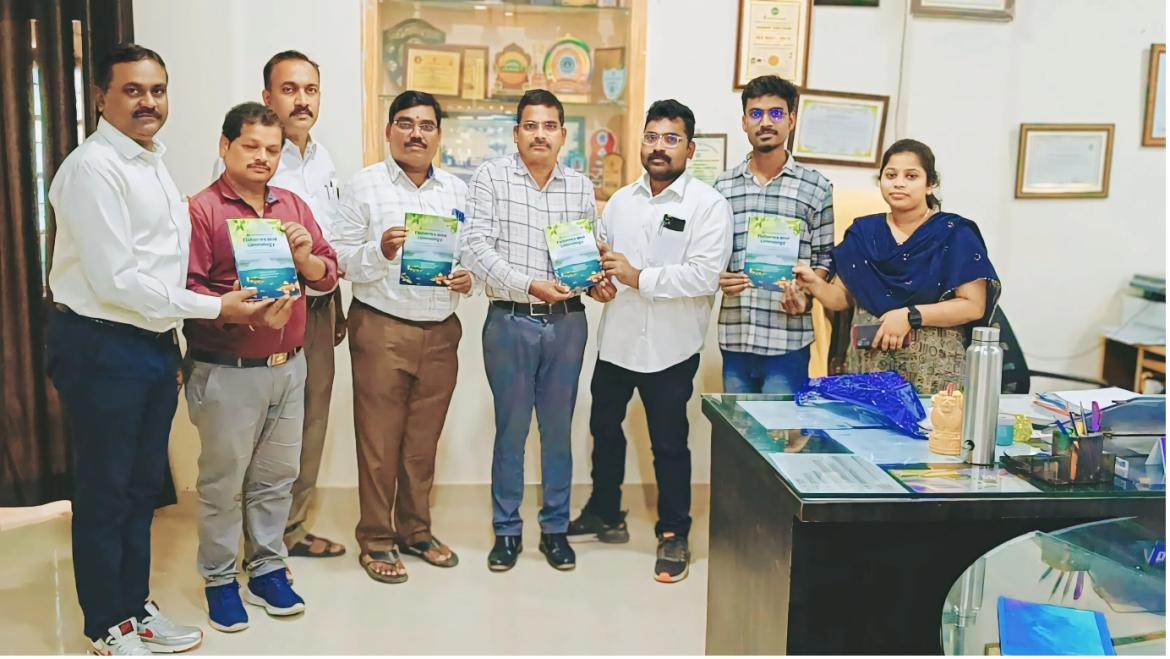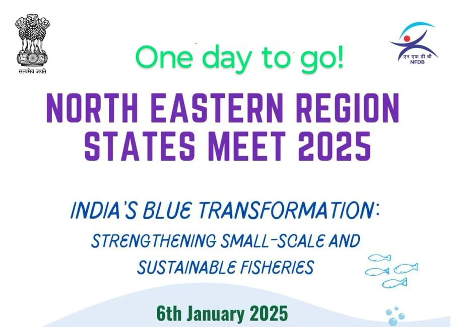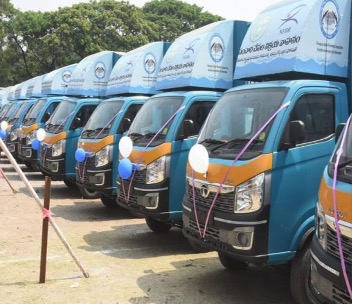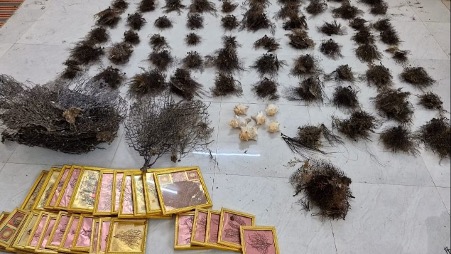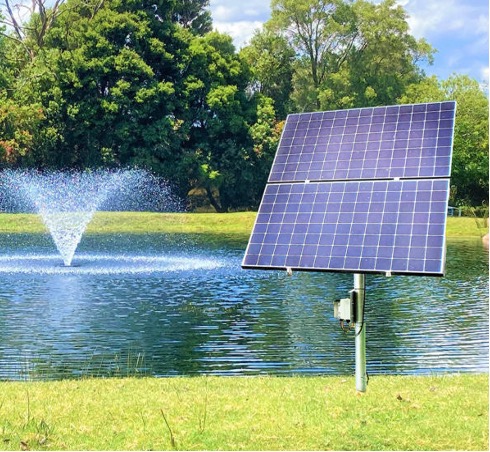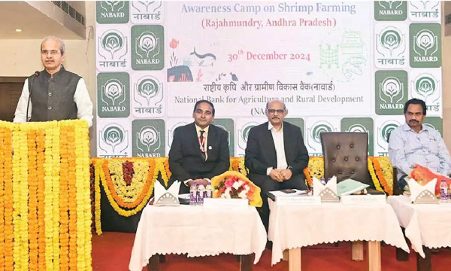India is making waves in the fisheries sector! Under the Pradhan Mantri Matsya Sampada Yojana (PMMSY), the Ministry of Fisheries, Animal Husbandry & Dairying has greenlit fisheries development projects worth a whopping ₹21,274.16 crore, with ₹9,189.79 crore as central government share.
The star of the show? 11 state-of-the-art Integrated Aqua Parks approved across 11 states—including Andhra Pradesh, Tamil Nadu, Odisha, and Assam—at a total investment of ₹682.60 crore.
These Aqua Parks will act as ‘one-stop hubs’ for India’s aquaculture revolution. From seed and feed supply to processing, cold storage, and market linkage—these parks aim to provide end-to-end infrastructure, reduce post-harvest losses, and boost fisher incomes through value addition and organized marketing.
The parks are strategically planned to support cluster-based development, driving efficiency, sustainability, and higher exports. States like Tamil Nadu (₹127.71 Cr) and Odisha (₹100 Cr) lead the funding charts, while smaller states like Tripura, Uttarakhand, and Nagaland also get a slice of this blue growth.
In the last 5 years (2020–2025), the PMMSY has become a game-changer—empowering fisherfolk, strengthening the seafood supply chain, and fueling the ‘Blue Economy’ dream.
This massive push not only secures India’s food future but also opens new global export doors for desi seafood.
India is swimming toward prosperity, one fish at a time!
National
𝗙𝗿𝗼𝗺 𝗦𝗮𝗹𝘁𝘆 𝘁𝗼 𝗦𝘂𝗽𝗲𝗿𝗳𝗼𝗼𝗱: 𝗦𝗼𝗹𝗮𝗿-𝗗𝗿𝗶𝗲𝗱 𝗙𝗶𝘀𝗵 𝗡𝗼𝘄 𝗣𝗮𝗰𝗸𝘀 𝟳𝟬% 𝗣𝗿𝗼𝘁𝗲𝗶𝗻 & 𝟭𝟮-𝗠𝗼𝗻𝘁𝗵 𝗦𝗵𝗲𝗹𝗳 𝗟𝗶𝗳𝗲!
What if your daily protein needs could be met with just 5 grams of fish?
That’s now possible, thanks to solar-dried epipelagic fish—like anchovy, sardine, and mackerel—processed under hygienic conditions by innovators at M.S.Swaminathan Research Foundation(MSSRF) in Tamil Nadu.
Traditional dried fish has over 30% salt, poor hygiene, and just 2-month shelf life. But with solar drying, the salt content is just 12%, moisture drops to 5-15%, and shelf life jumps to 9–12 months. Even better? Protein content doubles to 70%!
Solar drying speeds up the process 2x faster than open sun drying and avoids contamination. Women-led fish drying units in Cuddalore, Nagapattinam, and Poompuhar now use this tech, making safer, high-quality fish that sells at Rs. 450–800/kg, compared to Rs. 200–400 for traditional ones.
Aluminum foil packaging adds hygiene and longer shelf life—without the cost of vacuum packing. MSSRF has even trained fisherwomen in fish selection, hygiene, and packaging.
This innovation boosts nutrition, supports livelihoods, and enhances food safety—perfect for Anganwadi & Midday Meal Programs!
𝗙𝗿𝗼𝗺 𝗚𝘂𝗻𝘀 𝘁𝗼 𝗚𝗶𝗹𝗹𝘀: 𝗛𝗼𝘄 𝗙𝗼𝗿𝗺𝗲𝗿 𝗡𝗮𝘅𝗮𝗹𝗶𝘁𝗲𝘀 𝗶𝗻 𝗝𝗵𝗮𝗿𝗸𝗵𝗮𝗻𝗱 𝗧𝘂𝗿𝗻𝗲𝗱 𝗜𝗻𝘁𝗼 𝗦𝘂𝗰𝗰𝗲𝘀𝘀𝗳𝘂𝗹 𝗙𝗶𝘀𝗵 𝗙𝗮𝗿𝗺𝗲𝗿𝘀 – Narendra Modi
In a remarkable transformation, over 1,300 former extremists in Left Wing Extremism-affected areas of Jharkhand have turned to fish farming, forging a new path of peace and livelihood. This inspiring change has been made possible under the Pradhan Mantri Matsya Sampada Yojana (PMMSY) — a government initiative aimed at boosting India’s fisheries sector while fostering social and economic rehabilitation.
These ex-Naxalites, once part of insurgent groups, have now been trained in scientific aquaculture techniques, empowering them to build sustainable incomes. The government’s support through PMMSY not only offers financial aid but also technical know-how, equipment, and infrastructure — giving these individuals a second chance at life.
Fish farming in Jharkhand is doing more than just producing food — it’s driving peace, restoring dignity, and transforming rural communities. The initiative shows how the Blue Economy can be a powerful tool for inclusive development and conflict resolution.
Prime Minister Narendra Modi praised this achievement in his monthly radio address, Mann Ki Baat, highlighting it as a model for the nation. He emphasized that fisheries are not just a sector of economic growth but a force for social upliftment.
This story from Jharkhand is proof that when development meets vision, even the most unlikely journeys can end in hope. Fish farming is no longer just an industry — it’s a symbol of change.
𝗣𝗮𝗱𝗺𝗮 𝗛𝗶𝗹𝘀𝗮 𝗠𝗶𝘀𝘀𝗶𝗻𝗴 𝗳𝗿𝗼𝗺 𝗞𝗼𝗹𝗸𝗮𝘁𝗮 𝗣𝗹𝗮𝘁𝗲𝘀! 𝗠𝘆𝗮𝗻𝗺𝗮𝗿 & 𝗚𝘂𝗷𝗮𝗿𝗮𝘁 𝗙𝗶𝘀𝗵 𝗡𝗼𝘄 𝘁𝗮𝗸𝗲 𝗰𝗲𝗻𝘁𝗿𝗲 𝘀𝘁𝗮𝗴𝗲.
This year, Kolkata’s love story with Padma Hilsa (from Bangladesh) is on hold. With extremely limited supply and rising prices, fish traders and consumers are turning to hilsa from Myanmar and Gujarat instead.
Traditionally, Padma Hilsa is a must during festivals like Jamai Shashti and Durga Puja. But with poor imports and high costs (₹1,800–₹2,000/kg), people are choosing affordable options.
Why the shift?
Myanmar hilsa has softer bones and better availability
Gujarat hilsa is cheaper and accessible
Local demand is high, but Padma supply is low
Even fish markets like Sealdah and Gariahat are filled with non-Bangladeshi hilsa varieties. Experts say this may be the start of a long-term trend unless import policies and cross-border agreements improve.
Can India invest more in domestic hilsa production?
Will local hatchery-based solutions meet this growing demand?
One thing is clear: consumer preferences are changing fast—and the fish business must keep up!
FISHERIES BOOKS LAUNCHED FOR FISHERY SCIENCE STUDENTS IN TELANGANA
“An introduction to Fisheries and Limnology” books for Fishery science students have been launched at the Government Arts and Science Autonomous College, Kamareddy. Under the guidance of the Department of Zoology and Fisheries, these books are tailored for degree and postgraduate students studying fishery sciences.
The book launch ceremony took place on Saturday and was presided over by the college Principal, Dr. K. Vijay Kumar. During the event, Dr. Kumar expressed his appreciation for the initiative, congratulating the Head of the Department of Zoology and Fisheries, T. Malsoor, along with faculty members Pawan Kumar and Manasa, for their dedicated efforts in bringing this project to fruition.
A remarkable addition to this year’s academic advancements was the introduction of an MSc Fisheries program at the college. Sharing his thoughts, T. Malsoor conveyed his happiness over this milestone. He said, “The MSc Fisheries program marks a new chapter for our institution. We are committed to working diligently in the field of research to empower MSc students, equipping them with the knowledge and skills required to excel in current research trends and compete at Universitie’s level”
- Malsoor further emphasized the importance of fostering a strong research culture among students and ensuring they have access to modern resources and innovative learning tools.
The Principal encouraged the entire team to maintain their momentum and continue striving to enhance academic and research opportunities for students. The event also saw the participation of Vice Principal Kishtayya and faculty members Vishwaprasad, Dinakaran, Ramulu, and others, who lauded the department’s efforts and pledged their support for future endeavors.
The launch of these books and the introduction of the MSc Fisheries program underscore the college’s commitment to academic excellence and its vision to nurture future leaders in the field of fisheries and research.
NORTHEASTERN REGION STATES MEET ON FISHERIES TO BE HELD IN GUWAHATI
The Department of Fisheries, under the Ministry of Fisheries, Animal Husbandry, and Dairying, is organizing the Northeastern Region States Meet today in Guwahati, Assam.
Union Minister Rajiv Ranjan Singh will chair the event, which will focus on reviewing the implementation of the Pradhan Mantri Matsya Sampada Yojana (PMMSY). Prominent ministers from the Northeast are set to participate in the meet.
As part of the program, fisheries development projects worth ₹50 crore will be inaugurated, signaling a significant boost for the sector in the region. Certificates and awards will also be distributed to fisheries beneficiaries. A noteworthy highlight is the announcement of an Organic Fisheries Cluster in Sikkim, aimed at promoting sustainable aquaculture.
A technical session led by ICAR Deputy Director General Dr. J.K. Jena will discuss challenges and advancements in fisheries and aquaculture, offering valuable insights for the stakeholders.
This meet is expected to strengthen sustainable fisheries practices, enhance productivity, and improve the livelihoods of fisher communities across the northeastern states.
PANCHAYAT RAJ MINISTER TO DISTRIBUTE MOBILE FISH RETAIL OUTLETS UNDER PMMSY
In a significant step towards empowering women and boosting fish consumption, Panchayat Raj and Rural Development Minister Danasari Anasuya (Seethakka) will inaugurated the distribution of Mobile Fish Retail Outlets (MFROs) sanctioned under the Pradhan Mantri Matsya Samrudhi Yojana (PMMSY) today and the Blue Revolution. The ceremony will take place at Praja Bhavan today.
Financial Support and Beneficiary Details:
The initiative, backed by the Indira Mahila Shakti programme, is facilitated by the Society for Elimination of Rural Poverty (SERP), which has arranged bank loans to cover the beneficiaries’ contribution.
- First Phase Allocation: 32 units (one per district) sanctioned.
- Unit Cost: ₹10.38 lakh, including fabrication.
- Subsidy: 60% per unit, amounting to ₹6 lakh.
Beneficiaries are Self-Help Group (SHG) women engaged in fish retail, selected by the District Fisheries Officer and District Rural Development Officer (DRDO) with approval from the respective District Collectors.
Features of Mobile Fish Retail Outlets:
Each unit is equipped for:
- Storage and sale of raw fish.
- Preparation and marketing of fish-based dishes.
- Operation in strategic locations like markets and public spaces.
Objective:
This initiative aims to:
- Empower Women: Provide sustainable income opportunities for SHG women.
- Promote Fish Consumption: Increase the accessibility and popularity of fish as a nutritious food choice across the State.
The MFROs are expected to significantly contribute to the socio-economic upliftment of rural communities while strengthening the fisheries sector.
DRI SEIZES ILLEGAL WILDLIFE ARTICLES, APPREHENDS THREE PERSONS IN ANDHRA PRADESH
The Directorate of Revenue Intelligence (DRI) Hyderabad Zonal Unit has seized a significant quantity of illegal wildlife articles, including 9.812 kgs of dead Black Corals (Antipatharia), 0.286 kgs of dead Soft Corals (Alcyonacea), and six Trapezium Horse Conches (Pleuroploca Trapezium). The seizure was made from two individuals involved in the illegal trade.
Further investigations revealed that the supplier of these wildlife articles was based in Ongole, a coastal town in Andhra Pradesh. Acting swiftly, a team from the DRI’s Vijayawada Regional Unit apprehended the supplier and seized an additional 6.64 kgs of dead Black Corals on December 31.
Soft and Black Corals are rare and endangered marine invertebrates critical to the survival of coral reef ecosystems. These corals:
- Provide shelter and food for marine species.
- Are integral to maintaining ecological balance.
The illegal removal of these corals disrupts habitats and food chains, causing long-term ecological damage. Despite their ecological importance, these corals, locally known as ‘mahendrajaal’ (Soft Corals) and ‘indrajaal’ (Black Corals), are sold for ornamental purposes, believed to bring good luck when displayed in homes.
The apprehended individuals, along with the seized wildlife articles and vehicles, were handed over to the Forest Department of Andhra Pradesh for further investigation under the Wildlife (Protection) Act, 1972.
Officials emphasized that there are no verified medical or problem-solving benefits associated with Soft or Black Corals, underscoring the senseless destruction of vital marine life for decorative purposes.
This operation reflects DRI’s commitment to curbing illegal wildlife trade and protecting India’s biodiversity.
TRIPURA LEADS THE WAY IN SUSTAINABLE AQUACULTURE WITH INNOVATIVE TECHNOLOGIES
The Northeastern region of India, rich in water resources, is unlocking its potential in aquaculture, with Tripura emerging as a key player in driving economic growth, cultural preservation, and food security. Leveraging advanced technologies, the state has witnessed significant strides in productivity and sustainability. From Biofloc technology enabling fish farming in small spaces to Recirculating Aquaculture Systems (RAS) for efficient water reuse and solar-powered aerators for oxygen enhancement, innovative practices have transformed aquaculture in Tripura.
At the forefront of these advancements is Debtanu Barman, founder of Barman Aqua Clinics Private Limited, and his revolutionary creation, ‘Pond Talk.’ This solar-powered pond aerator integrates immediate water filtration and an auto-feeder, providing a holistic solution to enhance fish farming systems.
The Technology Innovation and Development Foundation (IITGTIDF) has recognized the significance of this innovation, awarding a ₹20 lakh grant for the project titled “Solar Powered Pond Aerator with Instant Water Filtration and Auto Feeder (POND TALK).” The initiative has been formally approved by IIT Guwahati.
“We received this grant under Barman Aqua Clinics Private Limited, a sister concern of Aqua Doctor Solutions,” Barman shared in an exclusive interview. “Our company, established in 2023, focuses on research and development in aquaculture and fisheries across the Northeastern states.”
Based in Tripura, Barman Aqua Clinics provides a comprehensive suite of services, including consultancy, training, fintech solutions, and market linkages. Since its inception, the company has completed over 100 consultancy projects, connected with more than 30,000 fish farmers, and trained over 5,000 individuals.
Debtanu Barman, a native of Melaghar in the Sepahijala district, brings over 14 years of expertise in aquaculture. Holding a B.F.Sc. from the Central Agricultural University, Agartala, and a master’s degree from Ghent University, Belgium, he has collaborated with global NGOs, laboratories, and government agencies.
Barman has also played a pivotal role in establishing women-led Farmer Producer Organizations (FFPOs) and promoting financial inclusion in collaboration with organizations like the National Cooperative Development Corporation (NCDC) and FishFed.
The Solar Revolution in Aquaculture
Solar-powered solutions like ‘Pond Talk’ are reshaping the fisheries sector, offering sustainable and cost-effective alternatives. In India, innovations such as solar-powered aerators, cold storage units, and drying technology have gained traction in states like Kerala, Tamil Nadu, and Gujarat. Globally, solar-powered fishing boats and floating solar panels are addressing challenges in resource efficiency and environmental impact.
With ‘Pond Talk,’ Barman Aqua Clinics is not only transforming aquaculture in Tripura but also positioning the state as a leader in sustainable fisheries practices. This initiative aims to reduce operational costs, improve productivity, and set a benchmark for eco-friendly aquaculture solutions, paving the way for a sustainable future.
Source: Business North East
NABARD EMERGES AS A PILLAR OF SUPPORT FOR SHRIMP FARMING IN ANDHRA PRADESH
NABARD Andhra Pradesh Regional Chief General Manager M R Gopal highlighted NABARD’s vital role in supporting fish and shrimp farmers through financial aid and strategic initiatives for the aquaculture sector. Speaking at a regional awareness workshop on shrimp farming, organised in collaboration with the State Fisheries Department, Gopal emphasised the importance of comprehensive planning for shrimp farming, processing, and exports.
Farmers from the erstwhile Godavari districts participated in the workshop, which focused on the challenges and opportunities in the aquaculture sector. Gopal called for collaborative efforts to enhance shrimp production and exports, particularly through financial assistance for establishing nucleus breeding centres for shrimp propagation.
Shrimp Farming: A Key Contributor
With a 974 km coastline, Andhra Pradesh is a crucial player in the domestic and global shrimp industry. The state has achieved remarkable growth in fisheries exports, significantly contributing to rural employment. Major export markets include China and the USA.
Key Insights from Experts
Dr A V Bhavani Shankar, CGM (NABARD HO), pointed out that India ranks second globally in fish production, with a 7% annual growth rate in the past seven years. Fisheries Department Joint Director Lal Mohammed highlighted that 70% of the aquaculture area is concentrated in East and West Godavari, Krishna, and Guntur districts. He also noted the introduction of innovative technologies like drones and the provision of electricity subsidies to over 54,000 aqua farmers.
NABARD’s Aqua Pragati Initiative
The workshop showcased NABARD’s Aqua Pragati initiative, which facilitates credit support for small, medium, and corporate-level farmers. Experts discussed Andhra Pradesh’s potential to strengthen its position in the global shrimp market through innovation and strategic planning.
The programme witnessed the participation of key dignitaries, including AGM SLBC Srinivasa Dasyam, NFDB representative Dr A V Madhuri, ICAR-CMFRI Principal Scientist Dr Joe K Kizhakudan, and MPEDA Joint Director Vijay Kumar, who shared insights to drive aquaculture growth in the state.
This collaborative effort underscores Andhra Pradesh’s commitment to leveraging its aquaculture potential, enhancing livelihoods, and cementing its place in the global shrimp industry.





